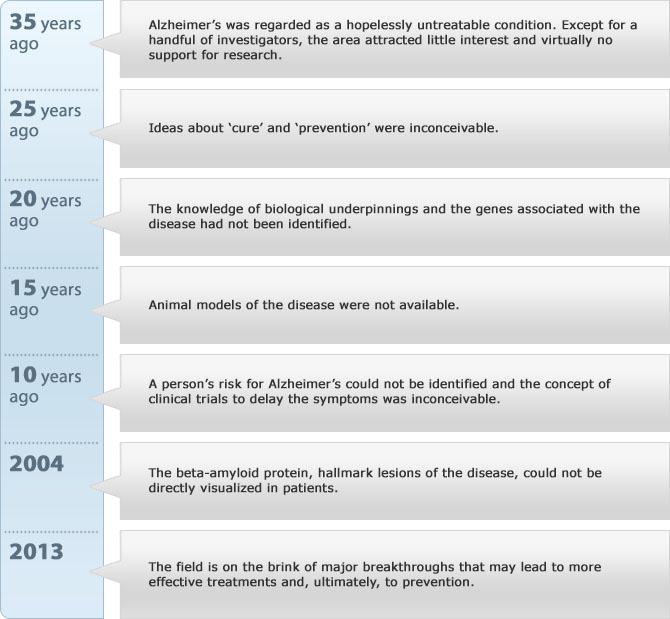Benefits of Early Detection & Alzheimer’s Diagnosis
Diagnosing the early symptoms of Alzheimer’s disease
If Alzheimer’s disease can be identified earlier, there is the potential to treat it earlier.
The onset of dementia associated with Alzheimer’s disease can go unrecognized for years23.
Studies have shown that the prodromal (early, pre-dementia) stage of Alzheimer’s is particularly long and progressive. The first decline in cognitive performances may appear as early as 12 years before dementia20.
This very early, ‘silent’ stage of Alzheimer’s disease, before there are clinical signs, provides a window of opportunity to potentially change the course of the disease.
It is thought that disease-modifying therapies for Alzheimer’s will be more effective if given well before people show any symptoms24.

Mild cognitive impairment (MCI)
There is not a definite border between normality and Alzheimer’s disease, but instead a spectrum or continuum. The major challenge involves distinguishing when onset occurs along the continuum from normal to Alzheimer’s17.
Mild cognitive impairment is a term that is often used to describe the cognitive disturbances that occur before the clinical diagnosis of dementia18.
Mild cognitive impairment is a descriptive term rather than a specific medical condition or disease. It describes memory loss apparent to the individual, and those around them. The memory loss is supported by formal memory tests, but other features of dementia are absent19.
Why it’s important to see your physician if you’re concerned about memory loss
There are many reasons why it is important to seek help as soon as possible if you are having memory problems. Here are some of them:
- Memory loss can happen at any age and can have many causes and it is certainly not possible to diagnose the cause yourself.
- Memory loss doesn’t necessarily mean that you or someone you know has Alzheimer’s. Stress, depression and heavy drinking1 can all contribute to memory loss, as can a number of other medical conditions.
- Confusion can also have other causes besides dementia, such as poor sight or hearing; emotional changes and upsets, such as moving or bereavement; or the side-effects of certain drugs or combinations of drugs.
- Early diagnosis will allow treatable conditions to be ruled out that may have symptoms similar to dementia. The sooner you are assessed, the sooner you can receive the right help - getting a diagnosis can be a lengthy process.
- By undergoing a formal assessment, you will also have a benchmark to compare future test results.
- You will be able to plan your everyday life and the future more effectively.
- You will be able to access advice, information and support (emotional, practical and financial) from social services, voluntary agencies and support groups.
Why is early diagnosis of Alzheimer’s disease so important?
A clinical diagnosis of Alzheimer’s requires a patient to already have dementia18.
The problem is, by this stage it can only be treated, not prevented. Drugs currently approved for Alzheimer’s can only offer symptomatic improvement.
However there is growing evidence that the disease process may actually start years before the first clinical symptoms are recognized20.
Therefore, one of the main challenges today is to be able to diagnose this very early stage of Alzheimer’s disease, before significant memory problems arise. This provides the opportunity for potential new treatment approaches that may alter the underlying disease process and have the potential to slow or halt progression of the disease.
How long does it take to get a diagnosis?
The time it takes to make a diagnosis associated with memory loss can vary. If scans and other investigations are required, these might take 4-12 weeks, depending on waiting lists. If the person is in the early stages of dementia, a 6-12 month period of monitoring may be required before a diagnosis can be made, and this may vary from country to country21.
Research advances in the ability to diagnose prodromal Alzheimer’s are continually being made. New technologies and novel applications of imaging techniques are rapidly evolving, offering promise for enhanced diagnosis in the future22.
Our understanding of Alzheimer’s is rapidly growing
Great strides have been made in the diagnosis and potential treatments for Alzheimer’s over the last few decades25:

Learn more about Changes to the Brain »


